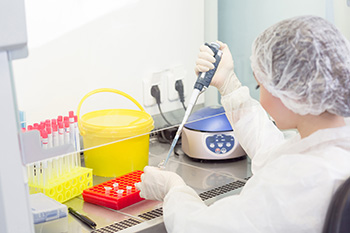Adoptive immunotherapies are “living drugs” because their effects depend on the function of living cells. To manufacture these drugs, a patient’s cells are genetically modified so that they make a receptor on the cell surface that recognizes and attaches to tumor cells and enables that patient’s own cells to kill the tumor cells. One such therapy is chimeric antigen receptor T cells or CAR-T cells. A very similar cellular therapy product is T cell receptor or TCR modified cells.

NYBCe/CCS conducts over 7,000 apheresis procedures every year and has provided 18,000 cell therapy products including hospitals, biotech, and pharmaceutical companies.
Both are relatively new and rapidly developing therapies in which the patient’s own immune-boosting T cells are genetically engineered in a laboratory to attack cancerous cells thereby strengthening the body’s immune system response to the tumor. To manufacture these therapies, T cells obtained from a patient’s blood are incubated in the laboratory with a gene for either the chimeric antigen receptor or TCR. The genetically engineered T cells, now equipped with their cancer-fighting receptor, are re-infused to the patient.
The cells are engineered through a six-step process:
- Leukapheresis: An apheresis collection process that collects white blood cells, some of which are T cells, from the patient’s blood.
- Genetic Engineering: The cells are incubated in the laboratory with genes that contain the code for the receptor that is designed to attack cancerous cells. These genes get incorporated into the patient’s cells, which then begin to make the receptor.
- Proliferation: The T cells are expanded in the lab to reach the sufficient cell number. They can then be frozen and stored until the patient is ready to receive the cells.
- Chemotherapy: Drugs used to prepare the patient’s body to receive and engraft the cellular therapy.
- CAR-T Infusion or TCR: The genetically engineered T cells are infused to the patient.
- Attack on Cancerous Cells: The T cells multiply in the body and attack cancerous cells.
At this time, the FDA has approved two CAR-T cell therapies:
1. Kymriah (tisagenlecleucel) by Novartis, for adults with relapsed or refractory large B-cell lymphoma and pediatric patients with relapsed or refractory acute lymphoblastic leukemia.
2. Yescarta (leukemia axicabtagene ciloleucel) by Kite Pharma and Gilead for adults with relapsed or refractory large B-cell lymphoma.
There are many additional treatments currently being studied for possible approval.
Major side effects of CAR-T therapies are neurotoxicity and cytokine release syndrome (CRS), a large, rapid release of cytokines into the patient’s blood. Signs of CRS include fever, nausea, headache, rash, rapid heartbeat, low blood pressure, and trouble breathing. The possibility of CRS requires that CAR-T and TCR therapy patients receive inpatient care to monitor their response to CAR-T therapy.
Recent Advancements in CAR-T Therapy
While the currently approved CAR-T therapies are autologous, meaning that the therapy is manufactured using the patient’s own cells, the goal is to develop “universal” cell therapies using cells from healthy allogeneic donors, thus enabling the use of a manufactured cellular therapy for many recipients. Recent interest in CAR-T therapy has increased the number of studies underway aimed at providing improved therapies for more diseases.
Studies underway are assessing the efficacy of CAR T-cell therapy in multiple myeloma, pediatric leukemias and solid tumors such as glioblastoma.
How New York Blood Center’s Comprehensive Cell Solutions Can Support Your CAR-T Therapy Research
A leader in autologous and allogeneic apheresis collections for cellular therapy, NYBC’s Comprehensive Cell Solutions has been collecting, manufacturing, storing and distributing hematopoietic progenitor cell (HPC) and mononuclear cell products since 1992. This decades-long experience has widened and honed CCS’ staff know-how and skills. CCS offers a team of highly trained, experienced professionals that perform over 7,000 apheresis procedures every year and offers you access to the latest technology and innovation in apheresis collections.
CCS’s Core Facilities are compliant with good manufacturing process specifications, Our history as an experienced blood center ensures quality systems which address safety, quality, identity, potency and purity. Our team of highly trained, experienced scientists and technologists have manufactured more 18,000 cell therapy products for clients including hospitals, biotech, and pharmaceutical companies. CCS’s laboratories currently manufacture cellular therapy products for clinical trials, including a TCR product for the treatment of solid tumors. NYBCe’s CCS maintains accreditation by all applicable bodies including FACT and AABB.
CCS’s extensive cellular therapy collection and manufacturing experience makes us an industry leader well-versed in the challenges associated with apheresis and cellular therapy product manufacturing. Download this tip sheet for answers to some of the most common questions regarding cellular starting material.